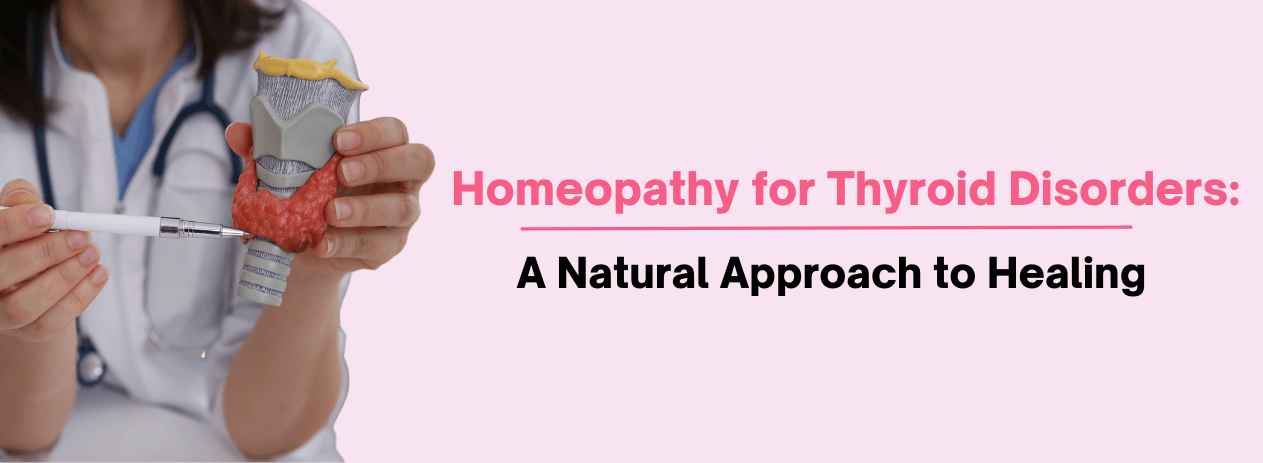| Homeopathy for Thyroid Disorders: A Natural Approach to Healing

Introduction
People of all ages are increasingly affected by thyroid disorders, which are widespread around the world. You probably know someone in your community or family who has thyroid disease. With more than 42 million thyroid patients, thyroid disorders are a major burden in India. One in three Indians has a thyroid condition of some form, which can cause hormonal imbalances and weight gain.
What Exactly Does the Thyroid Gland Do?
The thyroid gland is an organ near the base of your neck that resembles a butterfly's wings. It is an essential hormone gland and has a significant impact on the body's growth, metabolism, and development. It releases a regular amount of thyroid hormones into the circulation, which aids in the regulation of several bodily activities. The thyroid gland produces more hormones when the body requires more energy, such as during pregnancy or in colder climates.
The thyroid regulates the following vital bodily processes:
● Breathing
● Regulate body weight
● Heart rate
● Nervous systems, both central and peripheral
● Muscles Strength
● Menstruation cycle
● Body temperature
● Cholesterol levels
Some of the Common Thyroid Disorders
The thyroid gland usually generates the precise quantity of hormones required to maintain a healthy and balanced metabolism. When the thyroid malfunctions, either by producing too much or not enough T4 hormone, it can lead to thyroid illness. The most prevalent thyroid
conditions are as follows:
Hyperthyroidism
The thyroid gland is hyperactive and overproduces its hormone in this disease. Symptoms of
excessive thyroid hormone production include:
➢ Anxiety and irritation
➢ Weight Loss
➢ Brittle nails and hair
➢ Eye Bulging
➢ Investigations show Higher levels of TSH
Hypothyroidism
The reverse of hyperthyroidism is hypothyroidism. The thyroid gland is unable to generate enough of its hormones and is underactive. Symptoms of hypothyroidism include:
➢ Weakness and exhaustion
➢ Gaining weight
➢ Depression
➢ Memory issues
➢ Investigations show Higher levels of TSH
Hashimoto's Thyroiditis
The most frequent cause of hypothyroidism is Hashimoto's Thyroiditis. Although it can happen at any age, middle-aged women are more likely to experience it. The condition develops when the thyroid gland and its hormone-producing capacity are
unintentionally attacked and gradually destroyed by the body's immune system. The symptoms resemble those of hypothyroidism, and the condition can stay stable for years.
Graves' disease
The most frequent cause of hyperthyroidism is this Graves' disease. An autoimmune condition known as Graves' arises when the thyroid gland is unintentionally attacked by the body's immune system. This may result in the gland producing too much of the hormone that controls metabolism. Stress, smoking, pregnancy, and family history are a few of the risk factors. The signs and symptoms are typical of hyperthyroidism.
The Goiter
This is a hypertrophy of the thyroid gland, which is not Cancerous. Globally, a diet lacking in iodine is the most prevalent cause of goiter. Goiter can strike people of any age, particularly in regions of the world where iodine-rich foods are scarce. Among the symptoms are:
➢ Voice hoarseness
➢ The swelling around the neck area
➢ Breathing or swallowing difficulties
➢ Wheezing or coughing
Thyroid Cancer
Cancer that originates in the thyroid gland is known as thyroid cancer. When cells start to proliferate uncontrollably, cancer begins. Women are three times as likely than males to have it. Although the exact etiology of thyroid cancer is unknown, several risk factors have been found, such as a family history of goiter, significant radiation exposure, and specific genetic abnormalities. Typical signs and symptoms include:
➢ A lump in the neck
➢ Swallowing difficulties
➢ Enlarged lymph nodes
➢ Neck or throat discomfort
How to Avoid Thyroid Conditions
Thyroid illness may not be preventable, but you may lower your chance of developing it by leading a healthy lifestyle and avoiding complications by being diagnosed and treating it early. The following health advice can help you maintain the health of your thyroid:
● Get frequent checks with your doctor.
● Give up smoking.
● Regularly work out.
● Have more balanced meals.
● Improve your ability to handle stress.
What Are The Homeopathic Treatments for Thyroid Disorders?
Over the years, alternative medicine has grown significantly, providing a wide variety of therapeutic options to people looking for natural cures. Homeopathy is a holistic medicinal approach, according to research. It supports the body's natural healing mechanisms and aids in addressing the underlying causes of illnesses. By using highly diluted natural chemicals, homeopathy seeks to cure the underlying cause of illness rather than just its symptoms. Homeopathic therapy has been reported to have
resulted in notable improvements in the wellness of thyroid patients.
Homeopathic Treatment Plan
The process of creating a homeopathic treatment plan for thyroid conditions is dynamic and comprehensive. The first step is for the patient to consult the homeopathic doctor. This first session is crucial for gaining a comprehensive understanding of the patient's symptoms, lifestyle, medical history, and mental well-being. This thorough assessment takes into account not just the patient's thyroid status but also their mental, emotional, and physical health. Based on the information gathered during the
consultation, the doctor prescribes a homeopathic medicine according to the patient's symptom profile.
Pinaakin Skin and Homoeopathic Clinic's Thyroid Homeopathic
Medicine
Pinaakin Skin and Homoeopathic Clinic is now offering online consultations for thyroid homeopathic treatment as homeopathy continues to advance. Following a thorough evaluation, our team of experts will attend to your needs and offer you
the appropriate remedies for your thyroid symptoms. For more information contact us.
